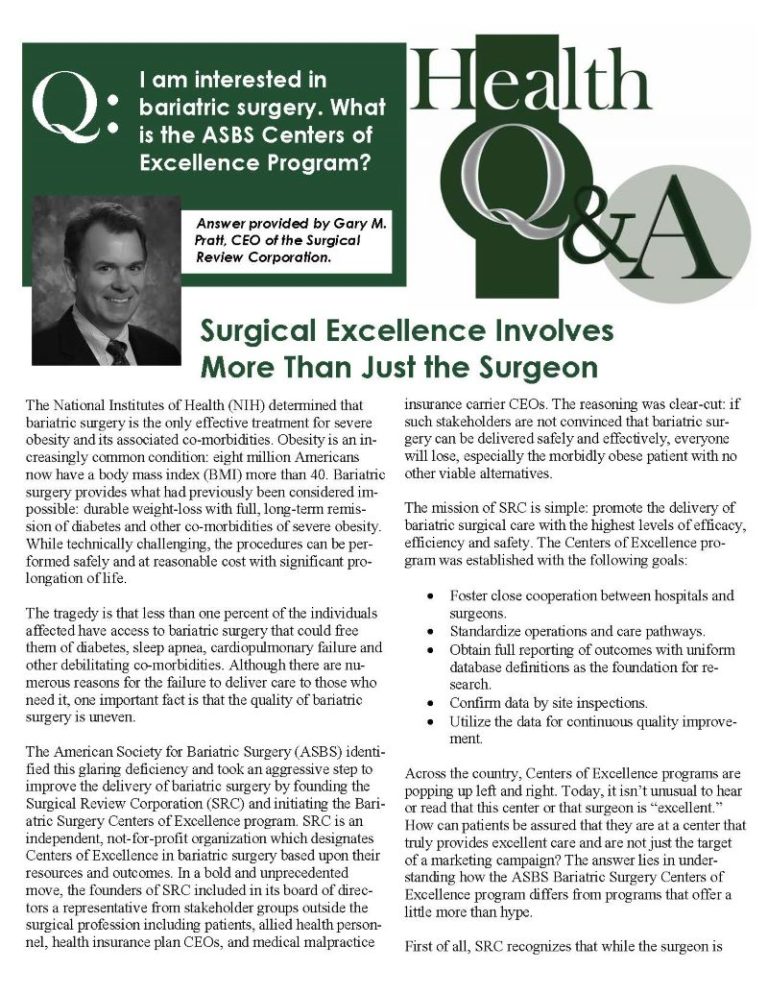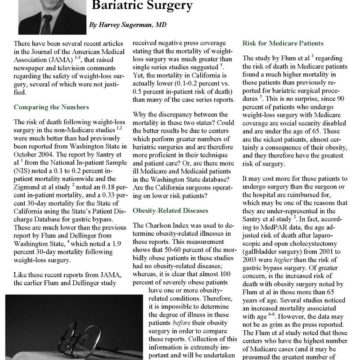Surgical Excellence Involves More than Just the Surgeon


by Gary M. Pratt, CEO of the Surgical Review Corporation
Winter 2006
The National Institutes of Health (NIH) determined that bariatric surgery is the only effective treatment for severe obesity and its associated co-morbidities. Obesity is an increasingly common condition: eight million Americans now have a body mass index (BMI) more than 40. Bariatric surgery provides what had previously been considered impossible: durable weight-loss with full, long-term remission of diabetes and other co-morbidities of severe obesity. While technically challenging, the procedures can be performed safely and at reasonable cost with significant prolongation of life.
The tragedy is that less than one percent of the individuals affected have access to bariatric surgery that could free them of diabetes, sleep apnea, cardiopulmonary failure and other debilitating co-morbidities. Although there are numerous reasons for the failure to deliver care to those who need it, one important fact is that the quality of bariatric surgery is uneven.
The American Society for Bariatric Surgery (ASBS) identified this glaring deficiency and took an aggressive step to improve the delivery of bariatric surgery by founding the Surgical Review Corporation (SRC) and initiating the Bariatric Surgery Centers of Excellence program. SRC is an independent, not-for-profit organization which designates Centers of Excellence in bariatric surgery based upon their resources and outcomes. In a bold and unprecedented move, the founders of SRC included in its board of directors a representative from stakeholder groups outside the surgical profession including patients, allied health personnel, health insurance plan CEOs, and medical malpractice insurance carrier CEOs. The reasoning was clear-cut: if such stakeholders are not convinced that bariatric surgery can be delivered safely and effectively, everyone will lose, especially a patient with no other viable alternatives.
The mission of SRC is simple: promote the delivery of bariatric surgical care with the highest levels of efficacy, efficiency and safety. The Centers of Excellence program was established with the following goals:
- Foster close cooperation between hospitals and surgeons.
- Standardize operations and care pathways.
- Obtain full reporting of outcomes with uniform database definitions as the foundation for research.
- Confirm data by site inspections.
- Utilize the data for continuous quality improvement.
Across the country, Centers of Excellence programs are popping up left and right. Today, it isn’t unusual to hear or read that this center or that surgeon is “excellent.” How can patients be assured that they are at a center that truly provides excellent care and are not just the target of a marketing campaign? The answer lies in understanding how the ASBS Bariatric Surgery Centers of Excellence program differs from programs that offer a little more than hype.
First of all, SRC recognizes that while the surgeon is one important component of excellent care, an “excellent” center is comprised of more than just the surgeon. Bariatric surgery, more than some other medical specialties, relies on the coordinated efforts of a multi-disciplinary team including nutritionists, psychologists, nurses, a compassionate office staff and a host of others. It involves a hospital making a long-term commitment to effective care of those with severe obesity with strong support from the highest levels of its administration. It involves a surgeon who devotes a majority of his or her practice to bariatric surgery – not just someone who dabbles in it.
Imagine having the very complex Roux-en-Y gastric bypass operation performed by a surgeon that does only two per month. While some Centers of Excellence programs focus exclusively on the hospital or exclusively on the surgeon, SRC believes that if you remove one or more of the above components from the equation, the center may be good, but it isn’t truly “excellent.”
Second, hospitals and doctors’ offices can hire architects and interior decorators to offer luxurious environments to entice their patients. But SRC excellence requires that the furniture and the equipment be specifically designed for and suited to the needs of those with obesity. More importantly, SRC requires that the staff be trained on how to handle patients with obesity without endangering both the patients and themselves.
Third, SRC looks closely at the outcomes for the center and the surgeon. Site inspectors who are experienced bariatric surgery nurses review adverse events, such as the deaths, re-operations and complications that have occurred at the applicant center during the prior 12-month period.
Patients can spend a significant amount of their time evaluating these various components of care; however the ASBS Centers of Excellence program is designed to save them the effort and enhance confidence in their decision. The application process to become an ASBS Center of Excellence is one of the most rigorous in the country. A center must first apply for Provisional Status, a designation that remains in place until the institution can demonstrate that it qualifies for Full Approval. Provisional Status is based on the adequacy of resources; Full Approval is based upon the achievement of acceptable outcomes.
To obtain Provisional Status, a center must prove that it has the resources necessary to provide safe and effective bariatric surgery and must demonstrate the proper training and experience of the staff and surgical group. SRC’s Bariatric Surgery Review Committee, which is comprised of some of the top bariatric surgeons in the country, reviews the information provided in the application, determines whether the guidelines are met and then grants or denies the designation. Once Provisional Status is granted, a center has two years to apply for Full Approval. Since this is a preliminary step toward reaching Full Approval, the center may not disclose that it has the Provisional Status designation.
For Full Approval, the application process involves assurance by the Center that the requirements for Provisional Status remain satisfied. The application requests additional information regarding patient populations, operations performed and outcomes. SRC conducts a site inspection of all Full Approval candidates to verify that the information provided in the application is accurate. A review of the bariatric surgery patients’ charts is conducted in accordance with the Health Insurance Portability and Accountability Act (HIPAA) guidelines. The information collected during the site inspection is then submitted to SRC’s Bariatric Surgery Review Committee for review along with the Full Approval application.
By comparison, some of the other centers of excellence programs ask the surgeon and/or the hospital to complete a multi-paged application and mail it in. Site inspections are rarely performed. Non-surgeons look at a respondent’s answers and stamp “approved” or “not approved” on the application.
The ASBS Bariatric Surgery Centers of Excellence program isn’t about marketing and doesn’t stop at designating its Centers as “excellent.” The designation is only the beginning of the process. The program requires that all centers who receive Full Approval submit outcomes information on their bariatric surgery patients to SRC. As a goal, it requires that follow-up be performed on a minimum of 75 percent of bariatric surgery patients over a five year period. As long as a Center maintains its Full Approval designation, it must report this information to SRC for as long as it follows its patients. We expect to accumulate data on more than 50,000 patients each year, an unprecedented database from which to improve quality.
Armed with a powerful database, SRC plans to take the meaning of Centers of Excellence to a higher level. Rather than simply having centers named and operating individually, SRC will ask Centers with the Full Approval designation to form a research and education consortium that will use the information from the database and the expertise at each of the Centers to pioneer breakthroughs in bariatric surgery. This consortium of excellence will ensure that bariatric surgery is delivered with optimal efficacy, efficiency and safety.
And the database will have another important benefit. As tough as the standards are for the ASBS Bariatric Surgery Centers of Excellence program, they are about to get tougher. Results from the database will be used to establish more rigorous criteria and standards to become a Center of Excellence.
SRC believes that bariatric surgical care isn’t as simple as choosing a good surgeon. We believe that the surgeon is an integral component, but the hospital and qualified multi-disciplinary team are equally vital. Patients shouldn’t be deceived into thinking that a program is “excellent” because a center did an “excellent” job of completing an application to become “excellent,” but should insist on evidence that the center is committed to an ongoing quality-improvement process that doesn’t stop once the certificate is issued.
“Excellence” is also about obtaining information that can be used to set higher standards and generate information that can save lives. Our Centers will be unified in their quest to deliver bariatric surgery safely, efficiently and most effectively. The ASBS Bariatric Surgery Center of Excellence is the gold standard upon which the patient can rely.
Progress of Centers of Excellence Program
- More than 500 hospitals and more than 900 surgeons have applied for Provisional Status
- More than 130 have applied for Full Approval
- To date, more than 60 Centers have been designated as an ASBS Bariatric Surgery Center of Excellence
About the Author:
Gary M. Pratt is CEO of the Surgical Review Corporation. A graduate from the University of Tennessee with degrees in marketing and accounting, Mr. Pratt has started seven successful businesses and was a partner in a national accounting firm.
by Robyn Pashby, PhD Winter 2024 “No one is ever going to date you if you don’t…
Read Articleby Kendall Griffey, OAC Communications Coordinator Winter 2024 The Obesity Action Coalition’s 12th annual Your Weight Matters…
Read Articleby Nina Crowley, PhD, RD (with Inspiration from Shawn Cochran) Winter 2024 Dating, no matter your age,…
Read Article









